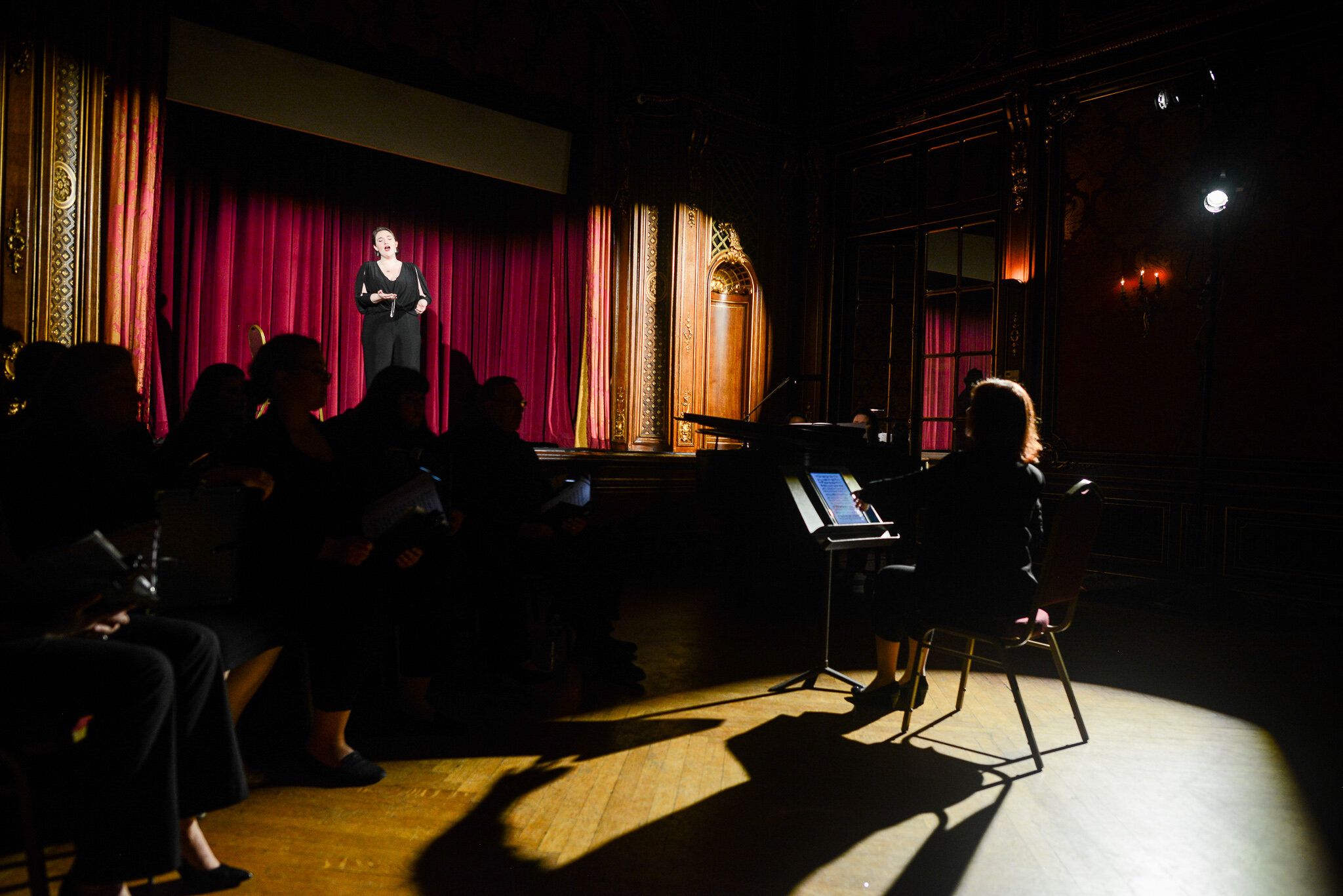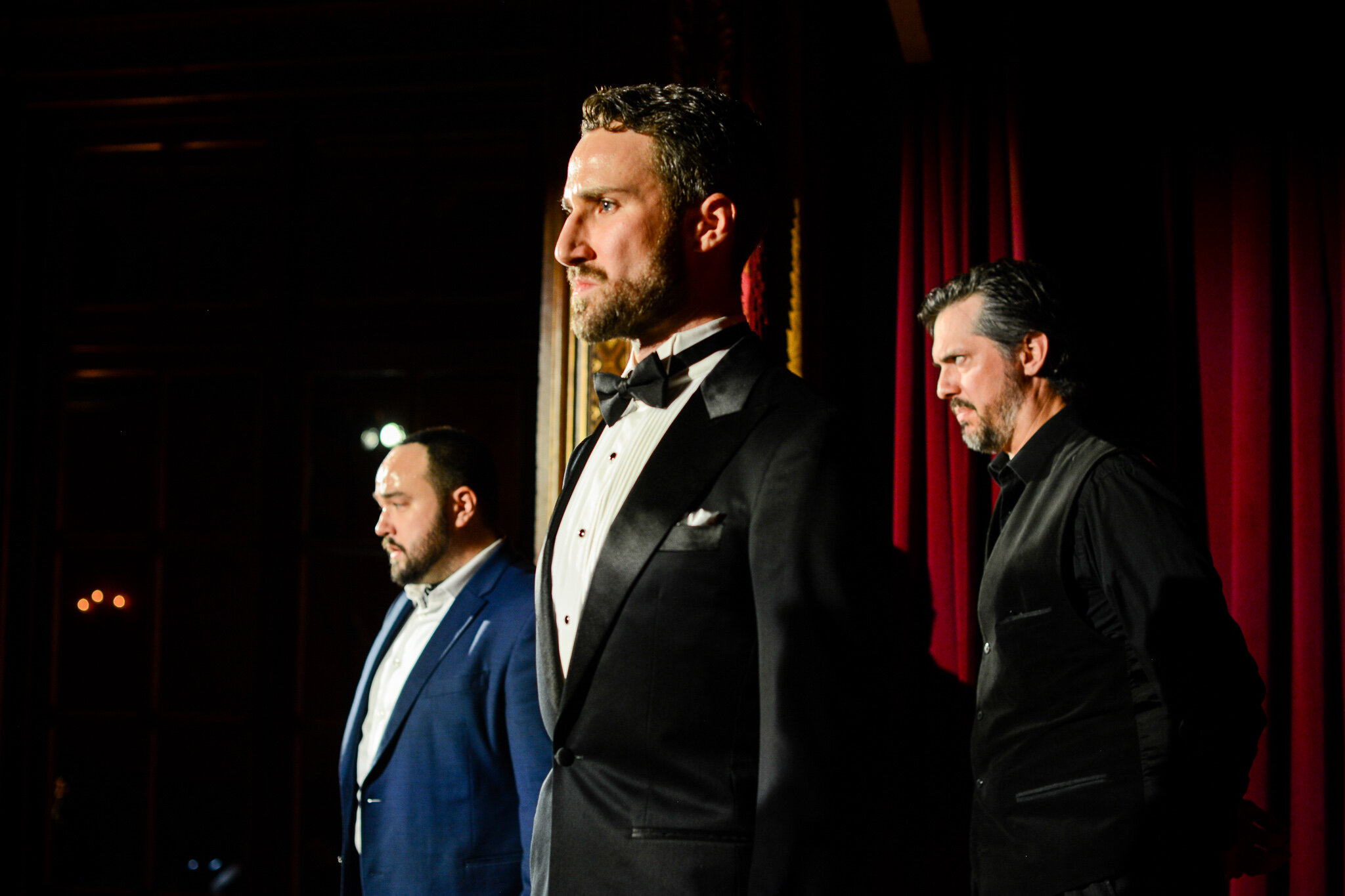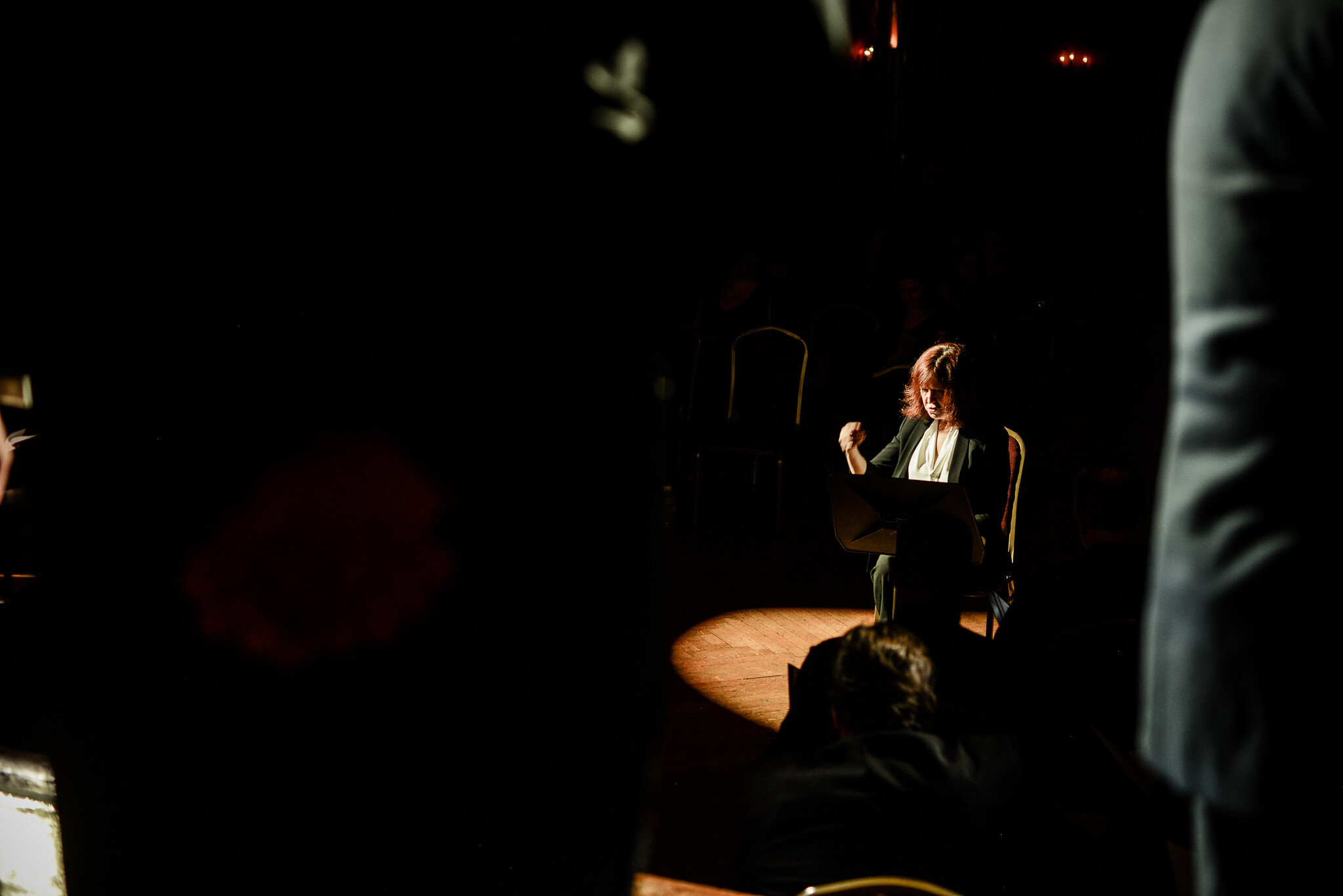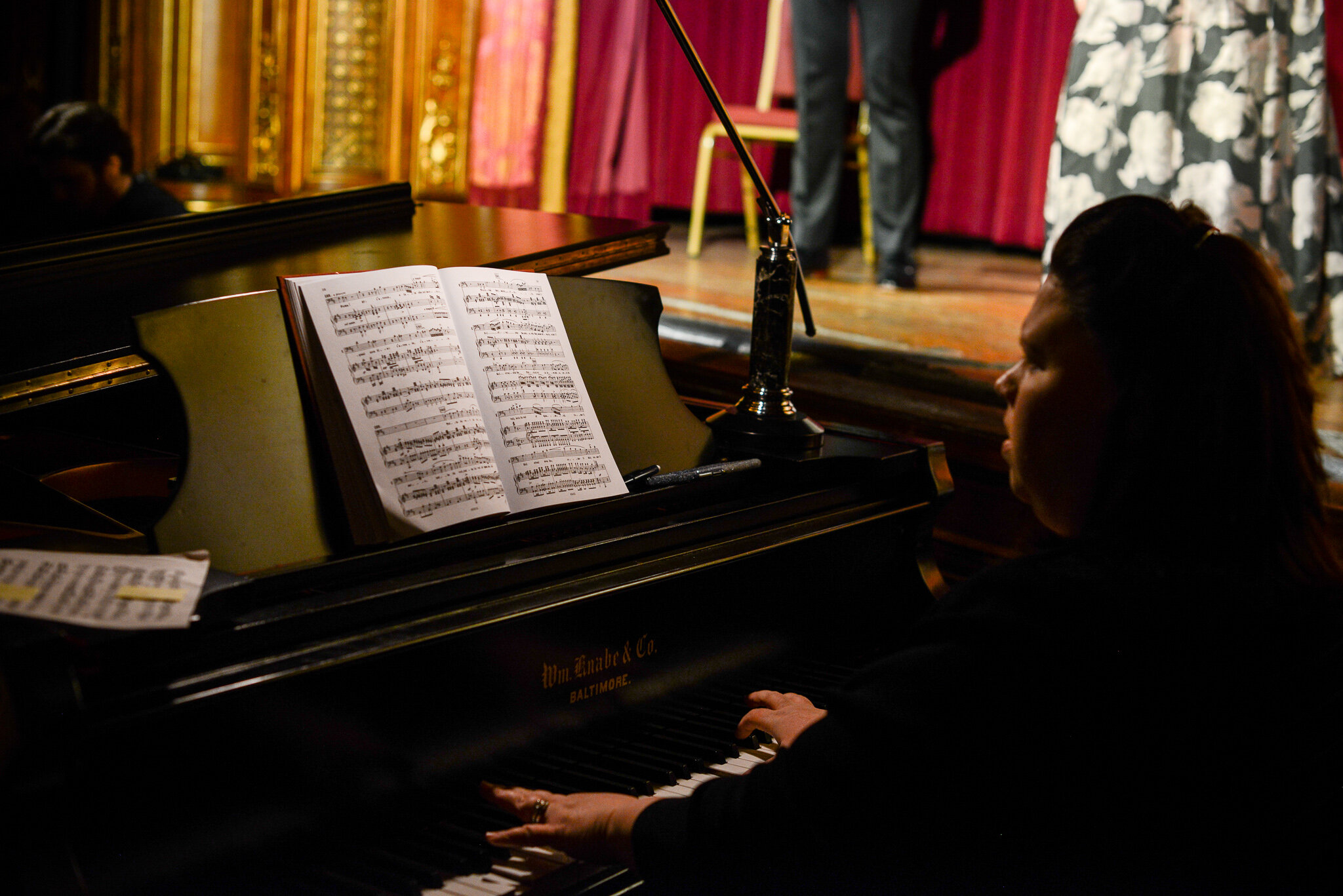On Sunday afternoon, seven handsome-voiced young singers provided an excellent concert performance of composer Gaetano Donizetti’s tragedy Anna Bolena. Enjoying a performance, however, is only part of the experience of attending a Baltimore Concert Opera production. Part is the casual and friendly atmosphere created in the gorgeous ballroom of the Engineers Club. Part is the coziness of the space placing you in close proximity to professional opera singers who are practically singing in your ear. Part is also the judgement that goes into selecting the operas to be presented. With that in mind, I asked BCO Artistic and General Director Julia Cooke – why Anna Bolena?
Her response:
“I have been wanting to program Anna Bolena and Donizetti's other two queens (Maria Stuarda and Roberto Devereux) for many years and am so thrilled that we have officially begun the cycle! We make great efforts in our artistic planning to present a varied selection of repertoire each season, giving our curious audiences a balance of classic (Madama Butterfly) and innovative (Anna Bolena, The Consul) programming. Our large subscriber base and consistent sellouts have given us confidence to keep that vibrant balance going -- our audience trusts BCO to give them a great experience every time. We have established a consistent record of great singing paired with our signature welcoming experience, and that trust between company and audience enables BCO to keep growing and thriving.”
left to right: Noragh Devlin as Smeton, Peter Tomaszewski as Lord Rochefort, Meghan Kasanders as Anna, Hans Tashijan as Enrico, Derrek Stark as Percy, and Hannah Ludwig as Giovanna. Photo by Britt Olsen-Ecker; courtesy of Baltimore Concert Opera.
Director Cooke refers to Donizetti’s Tudor queen trilogy. Anna Bolena was first of the three to be composed; though already the composer of over thirty operas, this was his first international success, one that established his reputation beyond Italy. Musicologists consider this opera as representing the maturation point of his own bel canto style; he along with Rossini and Bellini are know as the bel canto masters. In the next ten years, among many others, L’elisir d’amore, Maria Stuarda, Lucia di Lammermoor, Roberto Devereux, and La fille du regiment flowed from his pen, establishing him as one of the major figures in the development of Italian opera, and more were to come. At the time of his death, he had composed sixty-five operas, and one in every four operas being performed in Italy was his.
Derrek Stark as Percy and Meghan Kasanders as Anna. Photo by Britt Olsen-Ecker; courtesy of Baltimore Concert Opera.
He himself led somewhat of a tragic life. None of his three children survived longer than a few days and his wife died of cholera at the age of 29. Almost certainly these experiences contributed to his ability to express the depth of emotion conveyed in his operas, and to even bring such a sensational case as the beheading of Anne Boleyn down to a deeply human level. History tells us that her husband Henry VIII was a larger than life figure who took being a king seriously. In a reign of biblical proportions, he readily used and expanded his powers to get what he wanted; he even pushed the doctrine of the divine right of kings. He initiated the English Reformation by separating the Church of England from the Catholic Church, apparently because the Papacy refused to annul his marriage to Catherine of Aragon, his first wife; she had not given him the heir he wanted. He had an attraction to Anne Boleyn, one of Catherine’s ladies in waiting, but reports are she resisted his advances and held out for marriage. She became queen and his second wife, but she also failed to produce a son; so, soon Henry was taking up with one of her ladies in waiting, Jane Seymour, while still married to Boleyn. Anne was found guilty of what were likely trumped up charges and beheaded. King Henry acquired three more wives with their own stories, with one more being beheaded, but wives no. 2 and 3 serve as the basis of the story that Felice Romani used for the libretto of Anna Bolena. While the sensational event of her demise is the focus of their fictional story, it is the personalities of the characters involved and their relationships as created by Donizetti and Romani that are both compelling and heart rendering.
Hannah Ludwig as Giovanna and Hans Tashijan as Enrico. Photo by Britt Olsen-Ecker; courtesy of Baltimore Concert Opera.
(Switching to the Italian names in the opera) Anna Bolena is worried she has a rival in her marriage to Enrico VIII. She has reason to be. Enrico is pursuing Giovanna Seymour, wishing to marry her and make her his queen. Giovanna has been seduced by his love and her desire for fame, though she is later overcome with guilt and begs forgiveness from Anna. Enrico plots to bring Anna together with Percy with whom she was previously romantically involved, then accuse her of adultery to exit his marraige. Her brother Lord Rochefort and Smeton, a court musician who has fallen in love with Anna, become unwitting accomplices in Enrico’s scheme which ultimately succeeds; they both later beg forgiveness from Anna. Anna, innocent of wrongdoing, refuses to save her life by admitting her guilt. She forgives all to allow her soul entrance into heaven. Chop.
left photo: Noragh Devlin as Smeton. right photo: Derrek Stark as Percy, Hans Tashijan as Enrico, and Peter Tomaszewski as Lord Rochefort. Photos by Britt Olsen-Ecker; courtesy of Baltimore Concert Opera.
BCO put together an exciting young cast to deliver what turned out to be a highly enjoyable afternoon of bel canto singing that got an enthusiastic standing ovation when it concluded. The role of Anna was sung by soprano Meghan Kasanders, who has a voice with a lovely tone, and she delivers precise singing. Ms. Kasanders was a 2019 Grand Finalist in the Metropolitan Opera National Council Auditions and won both the First Prize and Audience Choice Winner in the 2019 Dallas Opera Guild Vocal Competition. Mezzo-soprano Hannah Ludwig delivered a convincing, strong portrayal of the conflicted Giovanna. She sang beautifully, her specialty being bel canto roles. I had to smile when tenor Derrek Stark began singing the role of Percy; for a brief moment an image of Pavarotti came to mind. Perhaps he doesn’t quite yet have the golden tones of the great one, but he has a beautiful tenor voice, and seemed a natural in an Italian bel canto role. I’d love to hear him in a return engagement. Bass-baritone Hans Tashijan, a BCO veteran, gave a solid, if a somewhat stoic, performance as Enrico; he sang well. When mezzo-soprano Noragh Devlin, in a pants role as Smeton, started to sing, I sat up and took notice; this was a distinctive voice. She sang well, and I wanted to hear more…brava! In their supporting roles, tenor Orin Strunk as Sir Hervey and bass-baritone Peter Tomaszewski as Lord Rochefort did fine jobs. BCO continued with their recent change in having performances partly staged, in this case, by simply having the singers move about the stage and react to each other in character, ending with Ms. Kasanders pushing her throat forward for the denouement. And no, we didn’t get to witness the chop.
left photo: Conductor Rachelle Jonck. right photo: Pianist Joy Schreier. Photos by Britt Olsen-Ecker; courtesy of Baltimore Concert Opera.
The excellent pianist, Joy Schreier, did a marvelous job in providing the accompaniment. The chorus, described in BCO’s fun and informal way as local peasants and party-goers, added effectively to the performance under the direction of Conductor Rachelle Jonck. BCO performances are partly serious concerts and partly partying. It keeps me coming back.
The Fan Experience: The two performances of Anna Bolena are past, but coming up on April 17 and 19 will be Monteverdi’s L’incoronazione di Poppea. BCO is now typically playing to sold out crowds, so get your tickets soon!
There is no longer valet parking on Sundays, but here is a link to parking options in the area. I continue to be successful at finding one of the limited open spaces on the streets, though this trip I almost missed the small sign on the meter indicating it was reserved for handicapped parking on Sundays in the first free space I found; be sure to read all the signs where you park!







